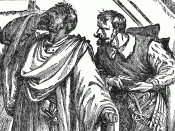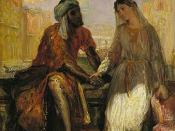The English Renaissance saw the rise of one of the most hailed writers in the literary history: William Shakespeare. His works clearly reveal his keen interest in man's affairs, of which he combined with two distinct characteristics of the Renaissance: a respect for classical learning with a boldness of experimentation. This effect is evident especially in his play "Othello", as he depicts Othello - the stereotyped lascivious black man - passionately married to Desdemona - the white nobleman's pure and vulnerable, daughter.
Religious tension which was rampant in England during this period, and the historical 'public' context in which it was written, would have contributed to a very negative reaction by the audience to the marriage. Venice was a powerful influential and extremely self confident state, and they saw themselves as a leader in the conflict between civilized Christianity (Venetians) and barbarism (Turks). Even though they were aware of Othello's Christianity from the start, it is inevitable that they should naturally associate him with his Muslim ancestors, the Turks, by his black skin.
However, the single assumption that the whole of the contemporary audience would have been horrified by the marriage because of Othello's black skin is oversimplified. After all, this was the time of the English Renaissance, when people were becoming more open minded, with the help of the printing press, combined with travels and the books travelers wrote, preventing Englishmen from being narrow minded and provincial.
But then again, it did not help that mixed marriages were a rare occurrence, as at that time black people were mostly slaves. Therefore, the Elizabethan Audience would also have naturally associated his black skin with slavery. It would have been somewhat mortifying; especially for the conservative groups, to watch a passionate exchange between Desdemona, portrayed as a white nobleman's daughter:...
![From the Library of Congress: TITLE: Thos. W. Keene. Othello CALL NUMBER: POS - TH - 1884 .O7, no. 1 (C size) [P&P] REPRODUCTION NUMBER: LC-USZC6-58 (color film copy transparency) RIGHTS INFORMATION: No known restrictions on publication. MEDIUM: 1 print (](https://s.writework.com/uploads/9/94760/library-congress-title-thos-w-keene-othello-call-number-pos-thumb.jpg)

